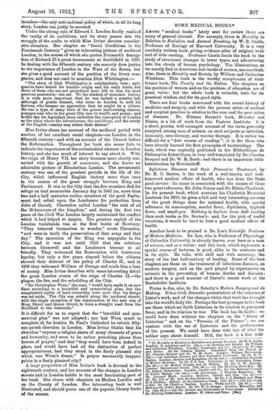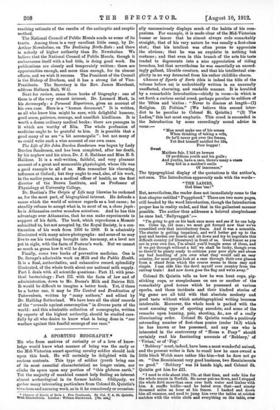SOME MEDICAL BOOKS.* AMONG "medical books" lately sent for review
there are many of general interest. For example, there is Heredity in Relation. to Evolution and Animal Breeding, by W. E. Castle, Professor of Zoology at Harvard University. It is a very carefully written book, giving evidence alike of original work and of wide reading. Professor Castle limits the book to the study of structural changes in lower types, not adventuring into the clouds of human psychology. The illustrations, as we mostly find in American text-books of science, are excellent. Also, there is Heredity and Society, by William and Catherine Whetham. This book is the worthy complement of their former book, The Family and the Nation. The chapters on the position of women and on the problem of education are of great value : but the whole book is valuable, both for its practical wisdom and for its good style.
There are four books concerned with the recent history of medicine and surgery, and with the present estate of medical and surgical practice in relation to the cure and the prermtion of diseases. Dr. Etienne Burnet's book, Microbes and Toxins, is a bit of work from the Pasteur Institute. It is a short, precise, well-arranged account of the views generally accepted, among men of science, on such subjects as infection, immunity, sero-therapy, and vaccine therapy. It is rather too difficult for a "first course of reading ": it is for those who have already learned the first principles of bacteriology. The book, which was orginally published in the Bibliotheque de Philosophie Scientifique, is very well translated by Dr. Charles Broquet and Dr. W. M. Scott : and there is an important little Introduction by Metchnikoff.
Infectious Diseases and their Preventive Treatment, by Dr. E. C. Seaton, is the work of a well-known and well- honoured medical officer of health, who has done the State good service : his name is associated with the names of those two great reformers, Sir John Simon and Sir Edwin Chadwick. In his present book, which contains his Chadwick Memorial Lectures for 1910, he gives a full and very interesting account of the great things done for national health, with special reference to consumption, scarlet fever, diphtheria, typhoid fever, and small-pox. Nothing is further from dull reading than such books as Dr. Seaton's : and, for the pick of useful vocations, it would be hard to beat a good medical officer of health.
Another book to be praised is Dr. Lee's Scientific Features of Modern Medicine. Dr. Lee, who is Professor of Physiology at Columbia University, is already known over here as a man of science, and as a writer : and this book, which represents a special course of lectures, is good, alike in its contents and in its style. He tells, with skill and with accuracy, the story of the last half-century of healing. Some of the best chapters are those on the treatment of infectious diseases, on modern surgery, and on the part played by experiments on animals in the preventing of human deaths and diseases : and there is a good account of Carrel's recent work at the Rockefeller Institute.
Praise is due, also, to Dr. Saleeby's Modern Surgery and its Making. It is a vivid, dramatic presentation of the outcome of Lister's work, and of the changes which that work has brought into the world's daily life. Perhaps the best passages in the book are those which set forth Listerism in its relation to puerperal fever, and in its relation to war. The book has its faults : we could have done without the chapters on the " Abuse of Listerism" and on the "Promise of the Future " : we are content with the use of Listerism and the performance of the present. We could have done with less of what the author says about himself. Still, the book is a fine wide
• (1) Heredity in Relation to Evolution and Animal Breeding. By W. E. Castle. London : D. Appleton and Co. [6s.]—(2) Heredity and Society. By William and Catherine Whetharn. London: Longman and Co. [6s.]—(3) Microbes and Toxins. By Dr. Etienne Burnet. Translated from the French by Dr. Charles Broguet and Dr. W. M. Scott. London Heinemann. [5s.]—(4) Infectious Diseases and their Preventive Treatment. By Dr. E. C. &P., ton. London : Hodder and Stoughton [7s. 6d. net.]—(5) Scientific Features of Modern Medicine. By Dr. F. S. Lee. Columbia: at the University Press. 16s. 6d.]—(6) Modern Surgery and its Making. By Dr. C. W. Saleeby. London : Herbert and Daniel. [1N. 6d.]—(7) The Declining Birth-Rate. Dr. Arthur Newsholme. London : Cassell and Co., for the National Council of Public Morals. [6d. net.]—(8) Acromegaly: a Personal Experience. By Dr. Leonard Mark. London : Bailliire, Tindall and Cox. [7s. 6d.1— (9) The Life of Sir John Burden Sanderson. By Dr. J. S. Haldane and Hilo E. S. Haldane. Oxford: at the Clarendon Press. [10s. 6d.1—(10) The Origin of Life. B Dr. Charlton Bastian. London : Watts and Co. [Ss. 6d.]—(11) Milk and the Public Health. By Dr. W. G. Savage. London: Macmillan and Co. [10s. 6d.1—(12) The Control and Eradication of Tuberculosis. Edited by Dr. Halliday Sutherland. London: W. Green and Sons. (156.]
reaching estimate of the results of the antiseptic and aseptic method.
The National Council of Public Morals sends us some of its tracts. Among them is a very excellent little essay, by Dr. Arthur Newsholme, on The Declining Birth-Rate : and there is nobody of higher authority than Dr. Newaholme. We believe that the National Council of Public Morals, though it embarrasses itself with a bad title, is doing good work. Its publications are cleanly and temperately written : there are opportunities enough, and more than enough, for its utmost efforts, and we wish it success. The President of the Council is the Bishop of Durham, and it has a strong list of Vice- Presidents. The Secretary is the Rev. James Marchant, address Holborn Hall, W.C.
Next for review, come three books of biography : one of them is of the very utmost interest. Dr. Leonard Mark, in his Acromegaly : a Personal Experience, gives an account of his own case. Here is a " human document." It is written, as all who know him might be sure, with delightful humour, good sense, patience, courage, and unselfish kindliness. It is worth a dozen ordinary medical books : there are passages in it which are worthy of Elia. The whole profession of medicine ought to be grateful to him. It is possible that a good many of us are " a bit acromegalic ": but not many of us could write such a wise account of our own cases.
The Life of Sir John Burdon Sanderson was begun by Lady Burdon Sanderson, and has been completed, after her death, by his nephew and his niece, Dr. J. S. Haldane and Miss E. S. Haldane. It is a well-written, faithful, and very pleasant account of a great and memorable physiologist, whose life was a good example to all of us. Men remember his charming influence at Oxford ; but they ought to read, also, of his work, in the earlier years, as a medical officer of health, as the first director of the Brown Institute, and as Professor of Physiology at University College.
Dr. Bastian's The Origin of Life may likewise be reckoned as, for the most part, of biographical interest. He defends a cause which the world of science regards as a lost cause ; he steadily refuses to accept what is, to most of us, a chose jugee: he is Athanasius contra mundum scientium. And he has this advantage over Athanasius, that he can make experiments in support of his faith. The book, which reproduces a Memoir submitted to, but not accepted by, the Royal Society, is a con- tinuation of his work from 1906 to 1909. It is admirably illustrated with many micro-photographs : and some of us may live to see his teaching brought into harmony, at a level not yet in sight, with the facts of Pasteur's work. But we cannot so much as guess how it will be done.
Finally, come two books of preventive medicine. One is Dr. Savage's admirable work on Milk and the Public Health. It is a final, authoritative, and exhaustive record, splendidly illustrated, of the whole truth about our national milk supply. Part I. deals with all scientific questions : Part II. with prac- tical bacteriology : Part III. with the facts of law and of administration, down to Mr. Burns's Milk and Dairies Bill. It would be difficult to imagine a better book. Yet, if there be a better one, it may be The Control and Eradication of Tuberculosis, written by " many authors," and edited by Dr. Halliday Sutherland. We have here all the chief records of the "crusade against consumption" in diverse parts of the world : and this admirable collection of monographs, written by experts of the highest authority, should be studied care- fully by all who desire to know what is being done in "our warfare against this fearful scourge of our race."



































 Previous page
Previous page